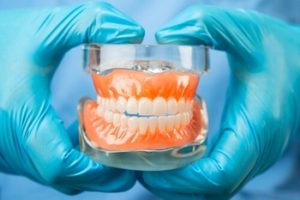For anyone experiencing tooth loss, dentures can provide a reliable path back to normal speech, comfort, and chewing ability. Whether you are exploring options for the first time or considering a replacement, understanding this question gives you insight into their strength, look, and overall performance. From the materials used in the denture base to the types of artificial teeth, every component is carefully chosen to serve both function and aesthetics. So, what are dentures made of?
Understanding the Materials Used to Create the Denture Base
The base of the denture supports everything you see and feel when wearing dentures. It holds the structure in place and mimics the shape and colour of natural gums. This foundation determines how comfortable and stable your dentures feel day to day.
 Gum-Coloured Acrylic Base Materials
Gum-Coloured Acrylic Base Materials
One of the most commonly used denture materials is gum-coloured acrylic. It is selected for its ability to blend in with natural gum colour while offering a lightweight and adaptable base. This type of denture acrylic is most commonly used in full dentures, where all teeth in the upper or lower jaw are replaced. Modern dentures rely on colour-matched acrylic to improve visual appeal and minimise the difference between real and replacement tissues. Because it is mouldable, it fits easily over the gums without causing irritation when properly adjusted. Most conventional dentures are fabricated using this method.
Flexible Nylon Alternatives
Some denture wearers prefer flexible bases, especially those who require removable partial dentures. These bases are typically made from nylon, which bends slightly to adjust to the mouth’s movement. Nylon offers more comfort for those with sensitive tissues or irregular ridges along the jaw. In cases where a patient still has remaining natural teeth, the flexibility helps improve grip without applying too much pressure. While not suited to every patient, this option has grown in popularity for partial plate wearers seeking enhanced adaptability.
Cobalt-Chromium Metal Frameworks
Metal-based denture frames are often used in partial dentures where strength and thinness matter. Cobalt chromium offers a strong yet lightweight foundation that does not cover as much soft tissue, allowing better taste and temperature sensitivity. These frameworks are also more durable over time, especially for those who rely heavily on chewing in areas where teeth are missing. Many removable dentures made with this material offer long-term stability and consistent fit when matched correctly to the dental impression.
When Resin-Coated Metal Is Used
In some removable partial dentures, a metal frame is coated with resin to combine the strength of cobalt chromium with the softness and appearance of an acrylic surface. This technique offers the structural benefits of metal with the comfort and natural appearance of resin. It is particularly helpful for replacing one or more teeth in areas where a full or partial plate must blend visually with nearby tissues. These hybrid bases are often fabricated in a dental lab using precise dental impressions for accuracy.
Materials Employed to Make Artificial Teeth in Dentures
Once the base is constructed, the next stage of denture fabrication involves selecting the right materials for the visible denture teeth. These elements are designed to mimic natural teeth in appearance and function.
Acrylic Resin Teeth
Acrylic resin is the most widely used material for creating artificial teeth, especially in full dentures and temporary dentures. These acrylic resin teeth are lightweight and easily adjusted during fitting. They can also bond well with the denture base, which improves the strength of the overall appliance. They are particularly useful in cases of tooth loss where comfort and ease of repair are important. Many complete dentures and partial dentures replace missing teeth using this versatile option.
Porcelain Teeth for Enhanced Wear Resistance
Porcelain teeth offer a more natural texture and sheen, closely resembling real enamel. Porcelain dentures tend to resist staining and wear better than acrylic but may be more prone to chipping if dropped. They are ideal for complete denture wearers who want long-lasting aesthetics and harder biting surfaces. These denture teeth are also suitable for the upper or lower jaw, where visibility is greater, and biting force is usually lower. The use of porcelain also enhances the natural gums look.
Composite Resin Options
In recent years, composite resins have emerged as a strong alternative to acrylic and porcelain. While not as hard as porcelain, they offer an excellent balance between appearance and function. Composite replacement teeth can be colour-matched more precisely and are less likely to fracture than porcelain. They also offer a softer bite surface, which is sometimes preferred by those with TMJ symptoms or delicate bone structures. Denture wearers who prioritise aesthetics and comfort may opt for composite options.
Choosing the Right Material Based on Function
The decision between acrylic resin, porcelain, or composite usually depends on several factors. These include the location of the missing teeth, the condition of the remaining teeth, the patient’s bite force, and their cosmetic goals. For example, porcelain may be selected for front teeth for its appearance, while acrylic may be chosen for molars to reduce strain. Full or partial plate wearers should discuss these priorities during their initial consultation to ensure the most suitable fit.
Why Dentures Still Matter: Everyday Benefits You Should Know
Dentures continue to play a key role in restoring comfort and function after tooth loss. Beyond aesthetics, they offer practical benefits such as clearer speech, easier eating, and better support for facial structure. Whether you are replacing teeth after extraction or seeking a long-term tooth replacement solution, dentures remain a reliable option. Creating dentures that fit well contributes to long-term comfort, especially when combined with consistent cleaning routines. For many, cleaning dentures daily becomes part of maintaining oral comfort and function. Modern options make replacing teeth more seamless than ever before.
Ready to Choose Dentures That Truly Fit? Let’s Talk Options

Dentures consist of a carefully shaped base and lifelike teeth, often made from acrylic resin, to restore chewing strength and appearance. Well-crafted new dentures also help support facial muscles and prevent sagging, offering more than just cosmetic benefits. Maintaining proper care is especially important if you are managing conditions like gum disease, which can affect fit and longevity.
With a full range of designs and materials available, our team can guide you toward dentures that fit securely and feel natural. Call us today on (07) 5317 1023 or (07) 5315 8076 to find the right fit for your smile.
References
https://www.webmd.com/oral-health/dental-health-dentures
https://www.sciencedirect.com/topics/nursing-and-health-professions/denture-base-material


 Gum-Coloured Acrylic Base Materials
Gum-Coloured Acrylic Base Materials



Recent Comments